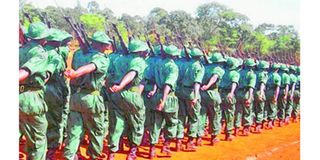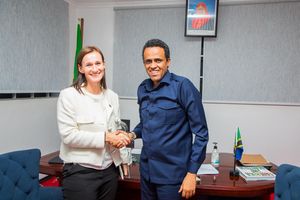The National Service and creation of social outcasts

On April 17, 2021, Tanzania’s Chief of Defence Forces, General Venance Mabeyo, announced the termination of the contracts of 854 youths from the National Service (JKT) for going on strike and marching to State House, demanding to be employed by the Tanzania People’s Defence Force (TPDF).
The world is not used to seeing four-stars generals making public addresses about employment issues in the army, so it didn’t come as a surprise when the announcement set tongues wagging on social media. Whatever the point that CDF wanted to make, it is possible that this issue was made to appear bigger than it really was.
Firstly, because of the authority of the person who made the address. Technically, this was a civilian matter, even though the chaps who were dismissed had undergone some military training, they weren’t soldiers yet. So, as far as public relations is concerned, probably a brief press release from the Ministry of Defence would have sufficed.
Secondly, because Gen Mabeyo, the man whose public stock has risen significantly lately, called the actions of the young chaps as tantamount to uasi. That’s a word which is a bit loaded to native Swahili speakers’ hearers, while it is translated “rebellion” to many it evokes strong connotations of “treason” – and that’s the last thing you want to hear associated with the military.
That said, anyone who knows anything about the army understands that those chaps crossed a line which should never be crossed, ever. Standing on the late President Magufuli’s promise that they should be recruited, they probably supposed that they had to stand strong, but how they thought they would be welcomed into the army after such a display is beyond me. Their military training notwithstanding, their thinking was still very much civilian-like. As a result, it’s quite unlikely that they will ever see the inside of a barracks again.
For many a young man, it is quite tough to live uraiani. The armies of bodaboda riders and wamachinga in our streets are indicative of forces that drive many to “volunteer” in JKT, not to acquire vocational skills, but to position themselves favourably for possible employment in the army. Unfortunately, the army can only take so many and, therefore, frustrations abound. Where promises are made, directly or indirectly, there is a danger of turning promising young men and women, whose main preoccupation is to survive for another day, into social outcasts – rebels.
Last year I published several articles about youth unemployment in Africa where I argued that Africa is letting its youths down. The National Service concept is indeed one of the potential solutions, but, as Gen Mabeyo rightly observed, the current system needs to be reviewed.
One of the questions that needs to be properly answered is this – why national service? In other words, what do people get after, say, three years of “volunteering” in the National Service (which is long enough for one to get a college degree)? If JKT won’t provide strategic solutions in the way that only a jeshi can, why not equip VETA centres to do what they do?
I propose a less orthodox but more strategic approach such that National Service candidates will go through a standardised system of on-the-job training, leading to the attainment of educational credentials (internationally recognised), in addition to military and vocational skills they usually get. This is a system like Germany’s highly acclaimed Apprenticeship System, which is credited for making Germany boast the lowest youth unemployment rate in Europe, and for its phenomenal success as an industrial giant.
Moreover, since the TPDF gets its candidates from JKT “volunteers”, selection criteria need to be very transparent to manage people’s expectations. Complaints that new entrants tend to be hired while those who have been labouring for ages are bypassed, breed mistrust, making reactionary outbursts inevitable.
Furthermore, why not turn the national service into an agency that deals with youth affairs and national development, apart from the army? The current model is a bit incongruent with the TPDF’s core business which is – to put it bluntly – prepare for war. The military role in safeguarding the nation’s interests, including the economy through, say, developing the nation’s cyber defences, patrol its waters so that foreign vessels don’t fish illegally, and patrol its borders so that the nation’s wealth isn’t smuggled out, is well known. However, when you see soldiers trying to make do by running retail shops, laying bricks, or operating social halls as the next man in the street, you have to wonder what’s going on.
I would like to believe that the military top brass understands the many benefits of this proposal – so I won’t go into the details here. But, in relation to the subject matter, it addresses the potential risk of allowing civilians to become a bit too close to the army, while they are not subjected to similar disciplines.
An army of young people can be used to rapidly build the nation, the fact which was ably demonstrated by the late President Magufuli in Dodoma. This fits perfectly with the National Service’s “building the nation” narrative, hopefully leading to industrial and agricultural revolutions in the country, while unleashing tens of thousands of youths through advanced vocational skills and massive job creation. Probably it is time we reform our systems to accommodate those lofty goals rather than sticking to old-fashioned approaches which end up achieving the very opposite, even the creation of social outcasts.





